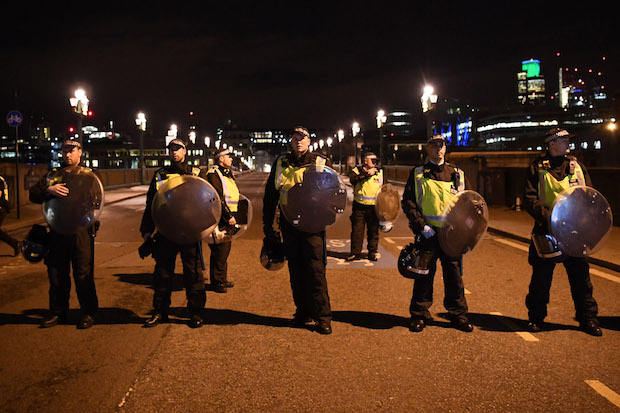Until last night, I always felt uncomfortable seeing police with guns on the UK’s streets. It’s just not very British, I used to think. But after I had the misfortune to be on London Bridge in the immediate aftermath of the terrorist attack, I’ve changed my mind.
I was in an Uber with my wife heading south over the Thames. We saw one victim on the pavement, another in the road; the driver pointed out yet another up ahead. Soon people started running across from the Borough Market end of the bridge talking about ‘stabbings’. A black cab driver shouted at us: ‘It’s Westminster all over again.’ Then there was a flash of blue lights a few yards behind us, and I saw two policemen jump out of a 4×4, grabbing kit, hastily strapping on their helmets. They drew two submachine guns from the car.
"I saw police jumping out, pulling on helmets, getting guns out." An eyewitness describes the scene following a terrorist attack in London pic.twitter.com/zCppaF3SD8
— Channel 4 News (@Channel4News) June 4, 2017
I never thought I’d be so glad to see armed police. The good guys on the bridge were no longer just unarmed first responders and other civilians in the wrong place at the wrong time. Now we had back-up. The cavalry had arrived: ready and willing to rush towards danger to keep the rest of us safe. Their speed and professionalism, and that of their colleagues in Borough Market, led to a truly astonishing result: three suspects were dead within eight minutes of the emergency services first being called. The attack was over.
It would be hard to improve on that response time. Even if every policeman in the capital was armed, or if soldiers routinely patrolled the streets, Paris-style. To neutralise terrorists who had carried out this appalling vehicle-ramming attack, and who had then proceeded on foot to knife Saturday night revellers – it’s worthy of medals.
But this isn’t just a point about police bravery and professionalism or the reassurance armed police can provide. It’s simply about domestic security policy: our un-militarised, responsive approach works. How do we deal with Islamist lunatics on the streets of London or Manchester? Surely not thousands more armed police, so London feels like a garrison and terrorists succeed in making all of us feel under siege. Do we have a permanent Operation Temperer, with soldiers on the streets to provide ‘reassurance’ (and also indicate to visitors that Britain is a country engaged in some kind of civil war)?
Theresa May spoke today about stepping up the response but she should be careful: the balance is already right. Yes, she has cut police numbers – but last night was a case study in how the Metropolitan Police are still able to move quickly to neutralise a threat very quickly. As Home Secretary, Mrs May had to draw a balance between Britain’s tradition of approachable, non-militarised police, and having the ability to take out a suicide bomber within minutes. What we have works. So if she wants to tighten up the system, the focus needs to be elsewhere: preventing radicalisation, and putting those who wish us harm behind bars.
There would have been hundreds of people crossing the bridge last night around 10pm; all of us, today, wondering what might have happened had our journeys gone slightly differently. I suspect all of us are thinking about the victims and the families of those bereaved, and how easily it could have been our families getting the bad news. It’s hard to pass through the scene of such an atrocity and not be haunted by such thoughts.
But today, I have two further thoughts: thank God for the armed police, and for a system that allows them to react so quickly – without being omnipresent. The British balance is right: let’s not change it.






Comments